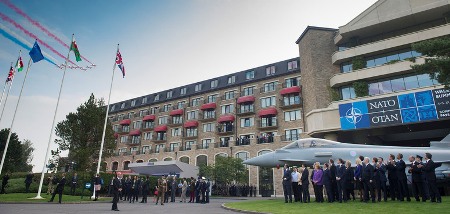Wales Summit Declaration praises Georgia's 'significant efforts'

Georgia’s efforts have been recognised by NATO leaders at the North Atlantic Treaty Organisation Summit in Wales.
On September 5 – the second day of the Summit in Newport, Wales – the NATO’s 28 leaders agreed on a Readiness Action Plan that would strengthen NATO’s collective defence and ensure the Alliance was ready to deal with any challenge.
Country leaders and heads of governments who participated in the meeting issued the Wales Summit Declaration on Friday, which praised Georgia for its efforts to progress its nation and reconfirmed its intentions to one day invite Georgia into the Alliance.
"At the 2008 Bucharest Summit we agreed that Georgia will become a member of NATO and we reaffirm all elements of that decision, as well as subsequent decisions. Since then, Georgia has made significant progress and has come closer to NATO by implementing ambitious reforms and making good use of the NATO-Georgia Commission and Annual National Programme," read the declaration, noting Georgia’s relationship with the Alliance contained all the necessary elements to continue moving Georgia towards eventual membership.
"Today we have endorsed a substantial package for Georgia that includes defence capacity building, training, exercises, strengthened liaison, and enhanced interoperability opportunities. These measures aim to strengthen Georgia’s defence and interoperability capabilities with the Alliance, which will help Georgia advance in its preparations towards membership in the Alliance," stated the declaration.
The document also reiterated NATO would continue to support Georgia’s territorial integrity and sovereignty within its internationally recognised borders. It also welcomed Georgia’s full compliance with the European Union (EU)-mediated cease-fire agreement and other multilateral measures that helped build confidence within the country and in the region.
"We welcome Georgia’s commitment not to use force and call on Russia to reciprocate," read the declaration. It called on Russia "to reverse its recognition of the South Ossetia and Abkhazia regions of Georgia as independent states and to withdraw its forces from Georgia".
The Alliance further encouraged all participants in the Geneva Discussions to "play a constructive role as well as to continue working closely with the OSCE, the UN and the EU to pursue peaceful conflict resolution in the internationally recognised territory of Georgia”.
Georgia’s efforts to progress the nation were highlighted in the Wales Summit Declaration, in which NATO said it recognised Georgia’s significant efforts to strengthen its democracy and modernise its military forces and defence institutions. The document said NATO welcomed the democratic development of Georgia, including through the peaceful transfer of power following parliamentary and presidential elections in 2012 and 2013.
"We encourage Georgia to continue implementation of reforms, including consolidating democratic institutions, taking forward judicial reforms and ensuring full respect for the rule of law," read the declaration.
Georgia’s efforts in international peacekeeping missions was also noted. NATO said it "highly appreciates Georgia’s sizeable contribution" to the ISAF operation and recognised the sacrifices Georgian troops had made in Afghanistan. It underlined that together with Georgia’s offer to participate in the NATO Response Force, Georgia’s military contributions demonstrated the country's role as a contributor to the Alliance's shared security.
In terms of defence, the declaration discussed the establishment of a Defence and Related Security Capacity Building Initiative to reinforce NATO's commitment to partner nations. This would also help the Alliance project stability without deploying large combat forces, as part of the Alliance’s overall contribution to international security and stability and conflict prevention. The initiative built upon NATO’s extensive expertise in supporting, advising and assisting nations with defence and related security capacity building.
"Building on our close cooperation and following their requests, we have agreed to extend this initiative to Georgia, Jordan, and the Republic of Moldova. Some partner nations themselves can bring unique partner insight and contributions to NATO capacity building efforts," read the declaration.
The Alliance said it was concerned by Russia's pattern of disregard for international law and particularly its behaviour towards Georgia and the Republic of Moldova.
"These developments may potentially have long-term effects on stability in the Black Sea region, which remains an important component of Euro-Atlantic security. Russia's current actions are contrary to the principles on which the established confidence building mechanisms in the Black Sea were built. We will continue to support, as appropriate, regional efforts by Black Sea littoral states aimed at ensuring security and stability," NATO leaders said in the document.
In general, NATO leaders believed Russia’s aggressive actions against Ukraine had fundamentally challenged their vision of a Europe "whole, free and at peace". At the same time, NATO found the growing instability in the southern neighbourhood – from the Middle East to North Africa, as well as transnational and multi-dimensional threats – also challenged their security, which could all have long-term consequences for peace and security in the Euro-Atlantic region and stability across the globe.
 Tweet
Tweet  Share
Share